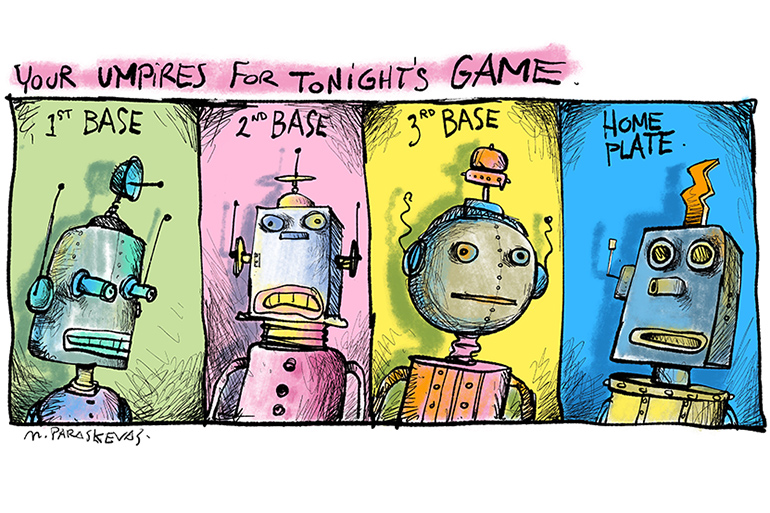Major League Baseball's Umpire Calls May Be Decided by Robots

It was inevitable that it would happen. Major League Baseball this summer had robot umpires call balls and strikes in a minor league to see if they want to do it in the majors. The way it worked was that the robot would establish the strike zone based on the height of the approaching batter and the distance he stood off the plate, focus in sharply on the arriving curve or fastball and then relay the result of its calculations into an earpiece of a living umpire leaning in from behind the plate.
“Strike one,” the robot would say.
“Strike one,” the human puppet umpire, feeling like a fool, would say, raising his right arm to indicate the strike.
Thus, in this minor league, anyway, “the umpire is blind” and “kill the umpire” and “wassa matta umpire, forget your glasses?” did no longer come wafting down from the stands.
Major League Baseball officials made note of what happened in this experiment. They haven’t yet said if they like it enough to bring it up to the majors.
This experiment took place this past summer here on eastern Long Island among other places, where a robot-called balls and strikes in the Atlantic League, one of the minor leagues not officially affiliated with Major League Baseball teams that includes teams such as the Long Island Ducks, the New Britain Bees, the High Point Rockers, the Somerset Patriots, the Lancaster Barnstormers, the Sugar Land Skeeters and the York Revolution.
Of course, Major League Baseball did not do this without the permission of the Atlantic League. This past spring, a deal was signed giving control of the Atlantic League’s baseball rules to MLB. For the next three years, Major League Baseball will be modifying the rules for play in the Atlantic League to see if something might work out. Among other things in this first year, they made a rule that if the game goes into extra innings, each inning begins with a runner on second. They also installed the robot umpires.
The Atlantic League is not to be confused with the Atlantic Collegiate Baseball League, nor the Hamptons Collegiate Baseball League, which had ties to the ACBL when it launched over a decade ago and whose teams now include the North Fork Ospreys, the Riverhead Tomcats, the Sag Harbor Whalers, the Shelter Island Bucks, the Southampton Breakers and the Westhampton Aviators, all of whom play their games on the East End. They play, in uniform, in public parks and at baseball fields at schools.
These leagues, and others like them in New England, New Jersey and other places, can act as a kind of minor, minor league for the Atlantic League. This past summer, Chris Pike of Southampton was called up to play with the Long Island Ducks in the Atlantic League after the scouts from there saw him play in a lesser league. And he was glad of it, going off from where he dealt with a regular umpire you could boo to a robot umpire whispering to a regular umpire—who, looking very sure of himself on the outside, while stupidly listening to what he was told to do on his earpiece inside, would dramatically make the call.
I think having a robot umpire takes a little spice out of this national pastime of ours. On the other hand, it does speed up the game, and its decisions are dead accurate.
Can a robot umpire be trained to throw you out of the game if you kick sand into its gears? If so, you will have deserved it.
Although, the robot’s decision to do that would get whispered into the ear of the human robot, so the human umpire would actually do it. Might as well get it done by a member of the offending player’s species. What a shameful situation.
Will it go any further? We’ll have to wait and see.



